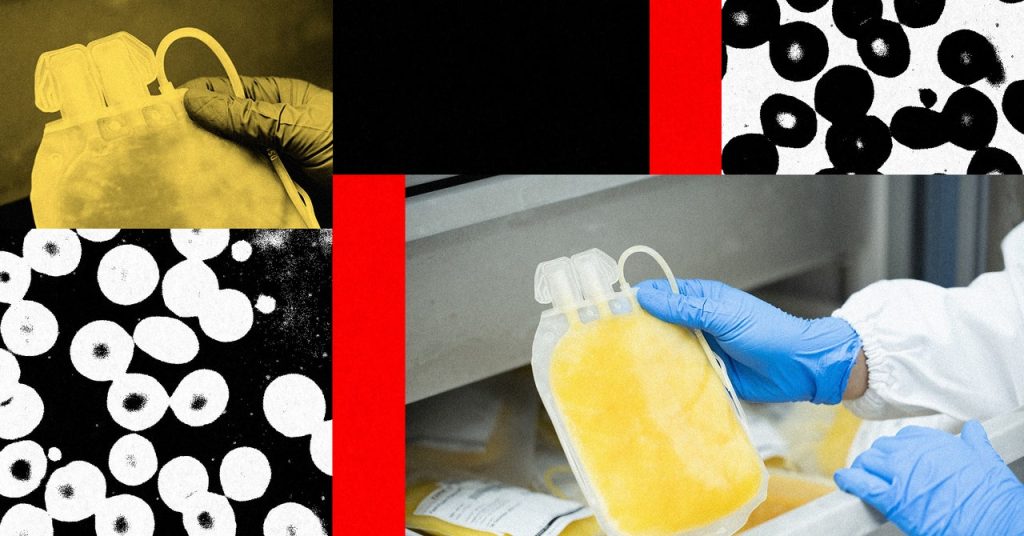Revolutionizing Blood Transfusions: The Potential of Artificial Platelets
The Scarcity of Platelets
Platelets, the cell fragments crucial for blood clotting, are often in short supply when blood donations run low. Unlike whole blood, which can be refrigerated for up to a month, platelets have a limited shelf life of just one week.
“Even if you have a ton of donations, you can’t bank them for long,” says Ashley Brown, an associate professor in the joint biomedical engineering program at North Carolina State University and the University of North Carolina at Chapel Hill.
Developing a Long-Lasting Solution
To tackle this issue, Brown and her team have developed an artificial substitute that could be stored for extended periods. In a recent study published in Science Translational Medicine, they demonstrated the effectiveness of their synthetic platelets in promoting clotting and accelerating healing in animals with severe internal bleeding.
The Importance of Platelets
Platelets play a vital role in preventing or stopping bleeding by forming clots. People with traumatic injuries, cancer, and certain chronic conditions that deplete platelets often require transfusions. Typically, platelets are collected through apheresis, a process that separates platelets from a donor’s blood.
Enhancing Accessibility and Efficiency
The limited shelf life of platelets means they are not commonly stored in rural hospitals and cannot be easily transported. Brown’s goal is to create an alternative that is easy to store and ship, allowing patients to receive treatment sooner, such as in an ambulance or on the battlefield, regardless of blood type.
The Science Behind Synthetic Platelets
To create their synthetic platelets, Brown and her team used a hydrogel to form nanoparticles that mimic the size, mechanics, and shape of natural platelets. They then designed an antibody fragment that binds to fibrin, a protein that helps platelets form clots, and decorated the surface of the nanoparticles with this fibrin antibody.
Promising Results in Animal Studies
The researchers tested various doses of artificial platelets in mice, rats, and pigs, comparing them to animals that received natural platelets and those that were not treated. Healing rates were similar in animals that received synthetic platelets and those that received natural ones, with both groups faring better than the untreated group. Surprisingly, only about a tenth as many artificial particles were needed to achieve the same healing effects as natural platelets.
Overcoming Challenges and Ensuring Safety
Replicating the functions of natural platelets has been a challenge, but after decades of research, the idea of a synthetic substitute is getting closer to reality. It is crucial to ensure that the surface decoration of these particles is just right, making them look and behave like platelets while avoiding any harmful consequences, such as triggering an immune reaction or causing abnormal clotting inside the body.
Advantages of Synthetic Platelets
One significant benefit of artificial platelets is that they can be freeze-dried and later rehydrated when needed. Unlike natural platelets, which are difficult to cryopreserve and must be stored at room temperature, synthetic alternatives could be frozen or stored at room temperature in a liquid or freeze-dried form and remain functional when transfused.
Potential Applications and Future Prospects
Artificial platelets could be used in various settings, such as ambulances, battlefields, or remote locations far from blood product centers. They may also benefit cancer patients who develop low platelet counts due to chemotherapy and can develop antibodies against transfused natural platelets.
While the platelets developed by the North Carolina team have yet to be tested in people, their startup, SelSym Biotech, aims to advance the product to clinical trials. Another company, Haima Therapeutics in Cleveland, Ohio, is also developing freeze-dried synthetic platelets based on research by Anirban Sen Gupta at Case Western University.
Human testing is likely just a few years away, McCrae says, and only then will scientists learn whether synthetic platelets are ready for prime time.

2 Comments
Artificial blood platelets? That could change the game for trauma patients, how incredible!
Wow, imagine the breakthroughs in emergency medicine with this innovation!